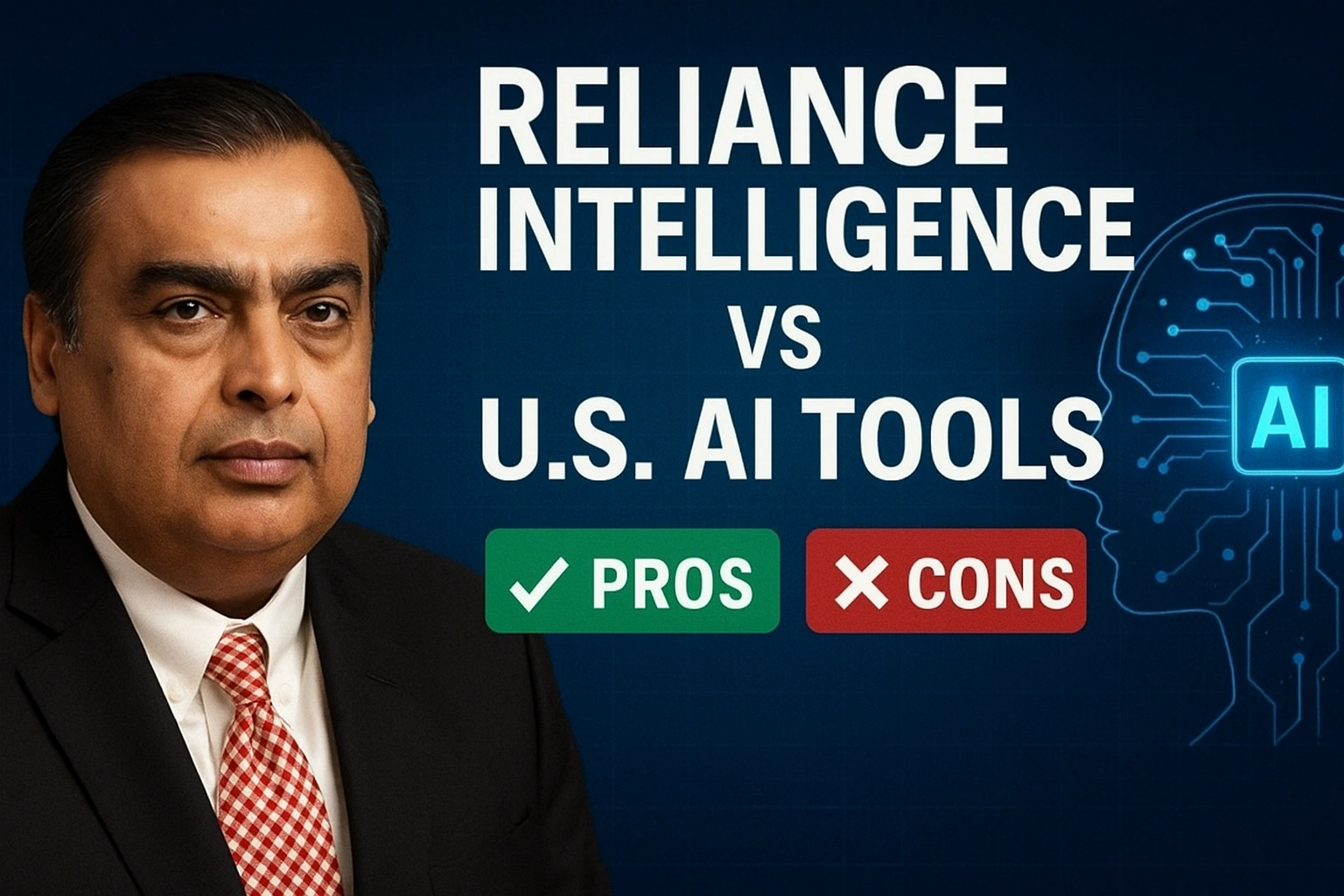
- September 8, 2025
- Top Search
- 8:52 am

Key Takeaways
Reliance Intelligence could be both a partner and a rival to U.S. AI giants—boosting adoption today but challenging them tomorrow with cheaper, localized AI.
“🎧 Listen to this article instead of reading (audio version below).”
Introduction: The Dawn of India’s AI Revolution
Artificial Intelligence (AI) is rewriting the rules of global business, governance, and daily life. Until now, the stage has largely been dominated by U.S. tech giants like OpenAI, Microsoft, Google, and Meta, who have poured billions into building large language models (LLMs), AI assistants, and enterprise tools.
But in August 2025, a new contender entered the arena. At Reliance Industries’ 48th Annual General Meeting, Mukesh Ambani unveiled Reliance Intelligence — a wholly owned AI subsidiary aimed at transforming Reliance into a deep-tech powerhouse.
Ambani called AI the new “Kamdhenu” — a mythical cow that fulfills every wish — symbolizing the limitless possibilities AI offers when combined with clean energy and genomics. With AI-ready gigawatt-scale data centers in Jamnagar, Gujarat, global partnerships with Google and Meta, and a vision to democratize AI for India’s 1.4 billion people, Reliance Intelligence is not just a local story.
It’s a move with global implications—especially for U.S. AI tools. Will Reliance Intelligence turn into a trusted partner, or an aggressive competitor? Let’s explore.
Understanding Reliance Intelligence
Reliance Intelligence is built on four strategic pillars:
- AI-Ready Data Centers at Gigawatt Scale
- Located in Jamnagar, Gujarat
- Powered by Reliance’s green energy ecosystem
- Designed to host AI training and inference at massive scale
- Located in Jamnagar, Gujarat
- Partnerships with Global Tech Leaders
- Google: Providing AI infrastructure through Google Cloud integration
- Meta: A joint venture to deliver LLaMA-based AI solutions for Indian enterprises, with Reliance holding 70% and Meta 30%
- Google: Providing AI infrastructure through Google Cloud integration
- Localized AI Services
- AI designed for Indian consumers, small businesses, and sectors like agriculture, education, and healthcare
- Multilingual, affordable, and easy-to-use
- AI designed for Indian consumers, small businesses, and sectors like agriculture, education, and healthcare
- Talent Development
- Aimed at building a world-class ecosystem of researchers, engineers, and product designers in India
- Aimed at building a world-class ecosystem of researchers, engineers, and product designers in India
With these pillars, Ambani has positioned Reliance Intelligence not as a side business, but as the core of Reliance’s future.
How Reliance Intelligence Affects U.S. AI Tools
Now, let’s shift focus to the global impact. U.S. AI companies like OpenAI, Microsoft, Google, and Anthropic have dominated the space. But Reliance’s entry could reshape the dynamics.
The Opportunities for U.S. AI Tools
- Access to a Billion-User Market
- India is the world’s largest digital democracy. With Reliance Intelligence, U.S. AI firms can reach new users via Reliance’s telecom and retail networks.
- India is the world’s largest digital democracy. With Reliance Intelligence, U.S. AI firms can reach new users via Reliance’s telecom and retail networks.
- Collaborations Already in Place
- Google and Meta are direct beneficiaries of this partnership. Reliance offers them the infrastructure and market reach, while they provide AI capabilities.
- Google and Meta are direct beneficiaries of this partnership. Reliance offers them the infrastructure and market reach, while they provide AI capabilities.
- AI Adoption Will Grow
- Cheaper and localized AI services will drive wider adoption in India, indirectly benefiting U.S. firms as part of the ecosystem.
- Cheaper and localized AI services will drive wider adoption in India, indirectly benefiting U.S. firms as part of the ecosystem.
- Multilingual Data Advantage
- U.S. AI models often struggle with non-English contexts. Reliance’s push for Indian languages may generate valuable datasets that U.S. companies can use to improve their global models.
- U.S. AI models often struggle with non-English contexts. Reliance’s push for Indian languages may generate valuable datasets that U.S. companies can use to improve their global models.
The Threats for U.S. AI Tools
- Pricing Disruption – The Jio Effect
- Just like Jio revolutionized telecom with ultra-cheap data, Reliance could make AI free or bundled with services. This undercuts the $20/month subscription model of tools like ChatGPT Plus.
- Just like Jio revolutionized telecom with ultra-cheap data, Reliance could make AI free or bundled with services. This undercuts the $20/month subscription model of tools like ChatGPT Plus.
- Local AI vs. Western AI
- Reliance will prioritize India-first AI assistants that understand local culture, languages, and needs.
- U.S. AI tools risk becoming secondary players in markets where local relevance is critical.
- Reliance will prioritize India-first AI assistants that understand local culture, languages, and needs.
- Regulatory Backing
- India is likely to push for data sovereignty, keeping sensitive AI development local. That could sideline U.S. firms in healthcare, governance, or defense-related AI.
- India is likely to push for data sovereignty, keeping sensitive AI development local. That could sideline U.S. firms in healthcare, governance, or defense-related AI.
- Potential Rivalry in Global Markets
- Today, Reliance is a partner. But tomorrow, with cheaper AI powered by green energy, Reliance Intelligence could compete globally, especially in Africa, the Middle East, and Southeast Asia.
Short-Term vs. Long-Term Impact
- Short Term (1–2 years):
U.S. AI companies benefit from partnerships and expanded market reach. Reliance is more of a collaborator than a competitor. - Medium Term (3–5 years):
Pricing pressure grows. Reliance pushes AI into everyday use, forcing U.S. firms to rethink how they price and position AI. - Long Term (5+ years):
Reliance Intelligence could emerge as a global AI competitor, just as Jio redefined telecom not just in India but as a case study worldwide.
Big Picture: A New AI World Order?
Reliance Intelligence signals a broader trend: AI is no longer a Western monopoly. Just as China built its own AI ecosystem (Baidu, Alibaba, Tencent), India now has a champion in Reliance.
This could lead to a multi-polar AI world, where U.S., Chinese, European, and Indian AI players coexist—sometimes as collaborators, sometimes as competitors.
For U.S. firms, the lesson is clear:
- Adapt to local markets
- Adjust pricing strategies
- Embrace partnerships
Because Reliance Intelligence is not just an Indian project — it’s a glimpse into the future of global AI competition.
Conclusion
Reliance Intelligence represents a turning point for AI. For U.S. AI tools, it’s both an opportunity (via partnerships and expanded adoption) and a threat (via pricing disruption and localization).
The big question is: Will Reliance Intelligence remain a partner to U.S. AI giants, or evolve into their fiercest rival?
Only time will tell—but one thing is certain: The AI revolution is no longer just a Silicon Valley story.
FAQs
Reliance Intelligence is a new AI subsidiary launched by Mukesh Ambani’s Reliance Industries in 2025. It focuses on AI-ready data centers, global partnerships, India-first AI services, and talent development.
In the short term, it opens partnership opportunities and market access. In the long term, it could become a competitor by offering cheaper, localized AI solutions.
Just as Jio disrupted India’s telecom industry with ultra-low pricing, Reliance Intelligence could disrupt AI economics by making services affordable or free.
Yes, potentially. With green-powered data centers and scalable infrastructure, Reliance may expand into other emerging markets beyond India.
Yes. It has partnered with Google (Cloud AI integration) and Meta (LLaMA-based enterprise AI joint venture).

Recent Posts:


AI Chatbot 2025: From ELIZA to Next-Gen Smart Assistants


